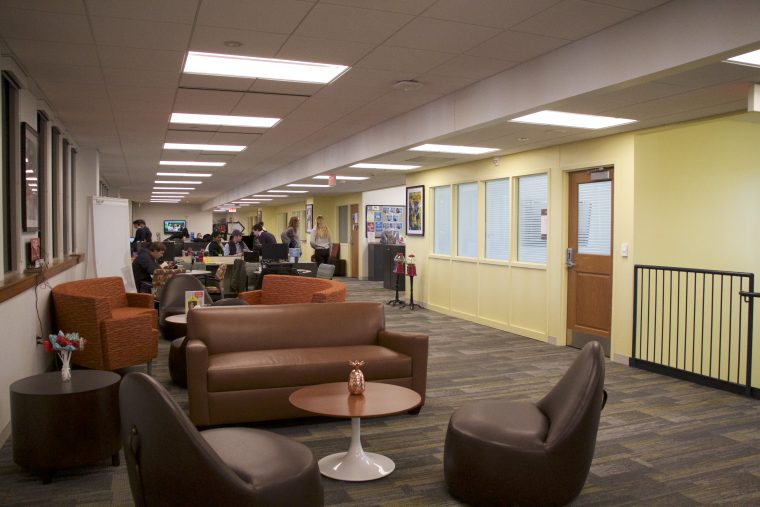Academics | News
SU president collaborates with student governments across the nation to advocate for accommodations in graduate school admissions process
With many students’ lives disrupted or completely upended by the COVID-19 crisis, many have taken advantage of the University’s recently-expanded pass/fail policies. Undergraduate courses taken as pass/fail, however, often do not count toward introductory course requirements for graduate programs, and an added worry is that courses taken without a letter grade may disadvantage students in the admissions process for graduate schools.
 Photo by Beth Wiesinger
Photo by Beth Wiesinger Student Union President freshman Ranen Miao has helped found a national coalition of student governments to advocate for pass/fail acceptance by graduate schools and other student concerns raised by COVID-19.
Partly as a response to these concerns about pass/fail, Miao emailed leaders representing 50 other student governments around the country, who then formed a Slack group to discuss pass/fail and other student concerns, like mental health services and the national government stimulus package.
The coalition has since sent out a letter, signed by student leaders from over 150 colleges and universities representing over two million students, to graduate schools, employers and scholarship providers outlining their support for increased leniency and acceptance of pass/fail credits.
“I felt it was incredibly unfair that there were going to be universities that rejected the brilliant students at Wash. U. on the basis of the fact that they might have to take a class pass/fail, or to expect that those students not take those classes pass/fail,” Miao said. “I think there are a lot of situations at home that make it incredibly difficult to study in the same way that we can at school, both in terms of the environment that students are in but also in terms of the resources that students have access to, and I think these issues are exponentially worse for students who are already underprivileged and marginalized.”
In the letter, which is published online, the coalition calls on graduate schools to be mindful of the effects of COVID-19 when evaluating applicants. Specifically, they ask for students to not be disadvantaged for taking courses pass/fail in spring 2020 during the admissions process, for acceptance offers to not be rescinded based only on spring 2020 grades, for GPA cutoffs to be removed or lightened and for standardized test thresholds to be lowered and applications to be reviewed more holistically.
“By standing together as a united collective and calling for these critical policies, we hope graduate schools and future employers will prioritize equity and accessibility in the wake of this unprecedented pandemic,” William Zhou, student body president at Brown University, said.
According to the letter, these changes to graduate school admissions would significantly lighten the load faced by students during the pandemic.
“COVID-19 has significantly impacted students’ wellbeing and learning environments,” the letter, which has more than 150 individual signatures, stated. “Its effects include detriments to physical and mental health, food/financial insecurities, rapid change in environment, lack of academic resources, and reduction of support services.”
According to Miao, the coalition received a letter from a group of six higher education associations across the United States that had been sent to the associations’ member colleges and institutions. The letter was sent by leaders of the American Association of Community Colleges, the American Association of State Colleges and Universities, the American Council on Education, the Association of American Universities, the Association of Public and Land-grant Universities and the National Association of Independent Colleges and Universities.
In the letter, the associations outlined a statement of principles on acceptance of credit, asking member colleges and universities to maintain holistic policies and practices, to provide flexibility and transparency in their admissions policies and to clarify those policies as soon as possible.
“We do not believe that there is one approach or one system that should apply to how institutions evaluate and accept credits when students seek to transfer between institutions, seek approval for non-traditional coursework, or apply to graduate and professional programs,” the letter, signed by the presidents of all six associations, stated. “However, we do believe that there is a set of common principles that institutions should keep in mind when developing policies regarding credit acceptance.”
While Miao said he was pleased to hear of their letter, he does not think the statement covered everything.
“[It] was, in my opinion, a great start, but something that we definitely need to build on in the long run because their principles did not try to mandate their member institutions switch to accepting pass/fail, when I think that should be the direction that we are moving in,” Miao said.
The coalition has also heard from the Rhodes Trust, which runs the Rhodes Scholarship. According to Miao, the Trust plans to be more flexible in its admissions process and will liberalize its GPA cut-offs.
After sending the letter and receiving these responses, Miao said he hopes to continue meeting with institutions to push for increased acceptance of pass/fail.
Besides pass/fail, the coalition will also work on other areas of concern, which include allowing counselors at colleges and universities to hold sessions with students across state lines and getting Congress to include students in a future stimulus package.
“I think getting this many student leaders on board could not be possible without a collective effort of all of us and a commitment toward making the response to COVID-19 equitable and empathetic and compassionate,” Miao said. “I think that’s especially what we need right now, because this is just not a normal time, and we should do everything in our power to help students across Wash. U. and across the country.”
